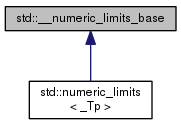Part of std::numeric_limits.
The static const members are usable as integral constant expressions.
- Note
- This is a separate class for purposes of efficiency; you should only access these members as part of an instantiation of the std::numeric_limits class.
Definition at line 192 of file limits.
| constexpr int std::__numeric_limits_base::digits |
|
static |
The number of radix digits that be represented without change: for integer types, the number of non-sign bits in the mantissa; for floating types, the number of radix digits in the mantissa.
Definition at line 201 of file limits.
| constexpr int std::__numeric_limits_base::digits10 |
|
static |
The number of base 10 digits that can be represented without change.
Definition at line 204 of file limits.
| constexpr bool std::__numeric_limits_base::has_denorm_loss |
|
static |
True if loss of accuracy is detected as a denormalization loss, rather than as an inexact result. [18.2.1.2]/42
Definition at line 262 of file limits.
| constexpr bool std::__numeric_limits_base::has_infinity |
|
static |
True if the type has a representation for positive infinity.
Definition at line 247 of file limits.
| constexpr bool std::__numeric_limits_base::has_quiet_NaN |
|
static |
True if the type has a representation for a quiet (non-signaling) Not a Number.
Definition at line 251 of file limits.
| constexpr bool std::__numeric_limits_base::has_signaling_NaN |
|
static |
True if the type has a representation for a signaling Not a Number.
Definition at line 255 of file limits.
| constexpr bool std::__numeric_limits_base::is_bounded |
|
static |
True if the set of values representable by the type is finite. All built-in types are bounded, this member would be false for arbitrary precision types. [18.2.1.2]/54
Definition at line 271 of file limits.
| constexpr bool std::__numeric_limits_base::is_exact |
|
static |
True if the type uses an exact representation. All integer types are exact, but not all exact types are integer. For example, rational and fixed-exponent representations are exact but not integer. [18.2.1.2]/15
Definition at line 223 of file limits.
| constexpr bool std::__numeric_limits_base::is_iec559 |
|
static |
True if-and-only-if the type adheres to the IEC 559 standard, also known as IEEE 754. (Only makes sense for floating point types.)
Definition at line 266 of file limits.
| constexpr bool std::__numeric_limits_base::is_integer |
|
static |
True if the type is integer. Is this supposed to be if the type is integral?
Definition at line 217 of file limits.
| constexpr bool std::__numeric_limits_base::is_modulo |
|
static |
True if the type is modulo, that is, if it is possible to add two positive numbers and have a result that wraps around to a third number that is less. Typically false for floating types, true for unsigned integers, and true for signed integers.
Definition at line 277 of file limits.
| constexpr bool std::__numeric_limits_base::is_signed |
|
static |
True if the type is signed.
Definition at line 213 of file limits.
| constexpr bool std::__numeric_limits_base::is_specialized |
|
static |
This will be true for all fundamental types (which have specializations), and false for everything else.
Definition at line 196 of file limits.
| constexpr int std::__numeric_limits_base::max_digits10 |
|
static |
The number of base 10 digits required to ensure that values which differ are always differentiated.
Definition at line 209 of file limits.
| constexpr int std::__numeric_limits_base::max_exponent |
|
static |
The maximum positive integer such that radix raised to the power of (one less than that integer) is a representable finite floating point number.
Definition at line 240 of file limits.
| constexpr int std::__numeric_limits_base::max_exponent10 |
|
static |
The maximum positive integer such that 10 raised to that power is in the range of representable finite floating point numbers.
Definition at line 244 of file limits.
| constexpr int std::__numeric_limits_base::min_exponent |
|
static |
The minimum negative integer such that radix raised to the power of (one less than that integer) is a normalized floating point number.
Definition at line 231 of file limits.
| constexpr int std::__numeric_limits_base::min_exponent10 |
|
static |
The minimum negative integer such that 10 raised to that power is in the range of normalized floating point numbers.
Definition at line 235 of file limits.
| constexpr int std::__numeric_limits_base::radix |
|
static |
For integer types, specifies the base of the representation. For floating types, specifies the base of the exponent representation.
Definition at line 227 of file limits.
See std::float_round_style for more information. This is only meaningful for floating types; integer types will all be round_toward_zero.
Definition at line 288 of file limits.
| constexpr bool std::__numeric_limits_base::tinyness_before |
|
static |
True if tininess is detected before rounding. (see IEC 559)
Definition at line 283 of file limits.
| constexpr bool std::__numeric_limits_base::traps |
|
static |
True if trapping is implemented for this type.
Definition at line 280 of file limits.
The documentation for this struct was generated from the following file:

